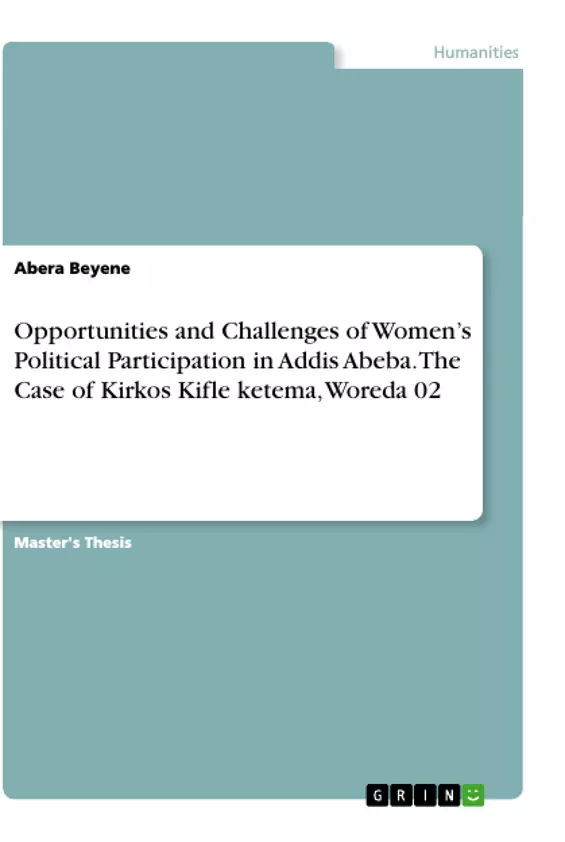This study explores the challenges and prospects of women’s political participation in Kirkose Kifle Ketema Woreda 02. The study was guided by the following objectives; the first was to assess women’s political participation in Kirkose Kifle Ketema Woreda 02 and how to empower women to participate in politics aimed at finding solutions towards political imbalance in Kirkose Kifle Ketema Woreda 02.
This study was conducted through Qualitative research methods with three parts FGD, document analysis and one part interview schedule for collecting data from the respondents. The study was utilized purposive sampling technique. In this Wereda there are 12000 residences from this 5539 are female but in terms of participation in politics they are only 350.Six focused group discussion was held each group contains five female generally 30 participant and 8 interviewee was held with the residence and heads of women children and youth office. Data collection was analyzed using themes and explanations while comparing and contrasting the findings with the literature review part of the study.
Inhaltsverzeichnis (Table of Contents)
- Acronyms
- ABSTRACT
- CHAPTER ONE
- CHAPTER TWO.
- REVIEW OF LITERATURE.
- 2. Introduction
- CHAPTER THREE
- RESEARCH DESIGN.
- CHAPTR FOUR.
- 4. ANALYSIS AND DISCUSSION.
- Chapter Five: Conclusion and Recommendation
- REFERENCES
- Attchements.
Zielsetzung und Themenschwerpunkte (Objectives and Key Themes)
This research report explores the opportunities and challenges faced by women in Addis Abeba, specifically focusing on the Kirkos Kifle ketema Woreda 02. The study aims to understand the current state of women's political participation in this particular area and to identify the factors that contribute to or hinder their involvement in politics. The report analyzes the existing political structures and processes in the area, examines the challenges women face in accessing leadership positions, and investigates the impact of gender-based discrimination and social norms on their political participation.
- Women's Political Participation in Addis Abeba
- Opportunities and Challenges for Women's Engagement in Politics
- The Impact of Gender-Based Discrimination and Social Norms
- Analysis of Existing Political Structures and Processes
- Challenges Faced by Women in Accessing Leadership Positions
Zusammenfassung der Kapitel (Chapter Summaries)
Chapter One provides an introduction to the study, outlining the background, significance, and objectives of the research. It discusses the context of women's political participation in Ethiopia and highlights the importance of understanding the factors that influence their involvement in politics. Chapter Two presents a comprehensive review of relevant literature on women's political participation, gender equality, and related issues. It examines various theoretical perspectives and empirical studies that inform the research. Chapter Three delves into the research methodology, outlining the data collection methods, sampling strategies, and data analysis techniques used in the study.
Schlüsselwörter (Keywords)
This research report focuses on the key concepts of women's political participation, opportunities, challenges, Addis Abeba, Kirkos Kifle ketema Woreda 02, gender-based discrimination, social norms, political structures, leadership positions, and research methodologies. It also examines the role of various organizations and institutions in promoting women's political empowerment. The report utilizes a comprehensive approach to understand the complexities of women's political engagement in the study area.
- Arbeit zitieren
- Abera Beyene (Autor:in), 2015, Opportunities and Challenges of Women’s Political Participation in Addis Abeba. The Case of Kirkos Kifle ketema, Woreda 02, München, GRIN Verlag, https://www.grin.com/document/1035296



